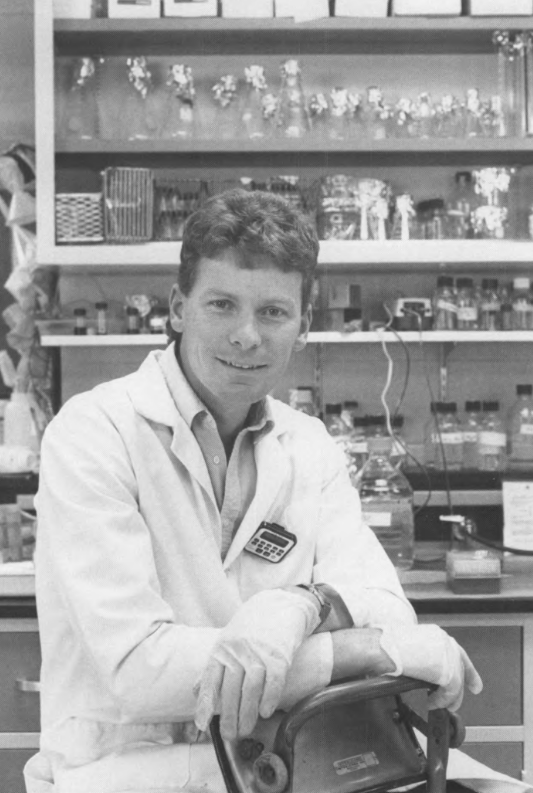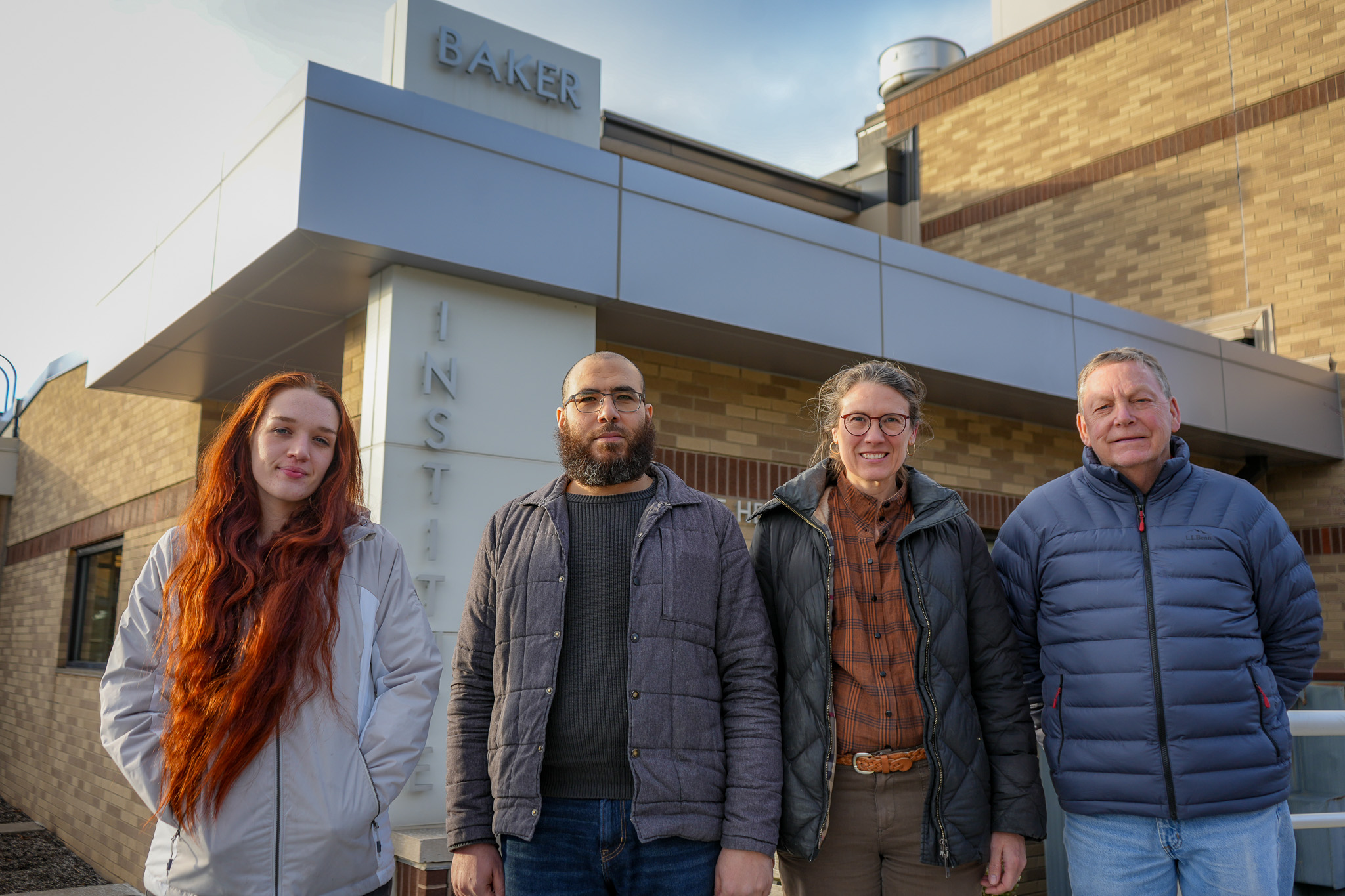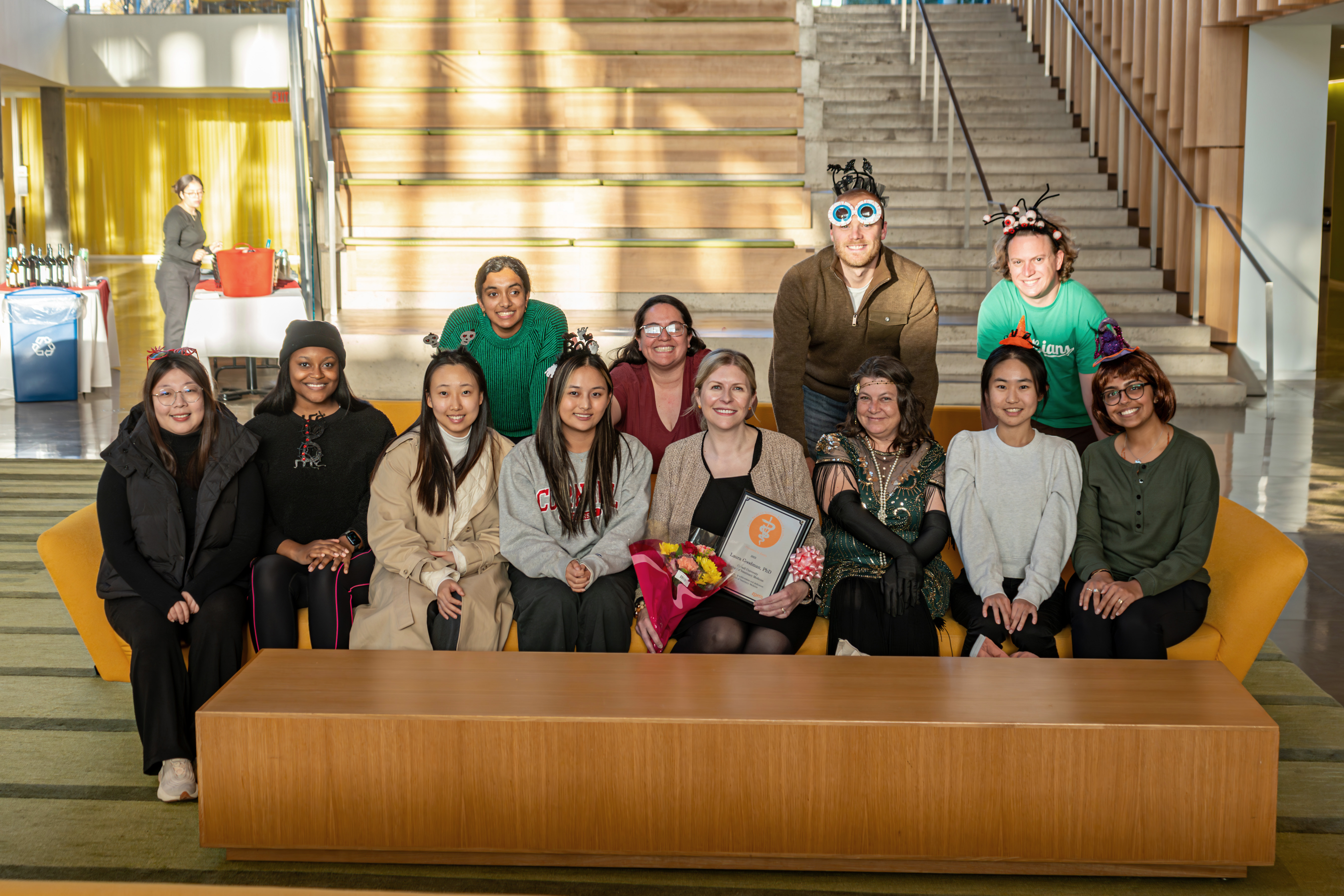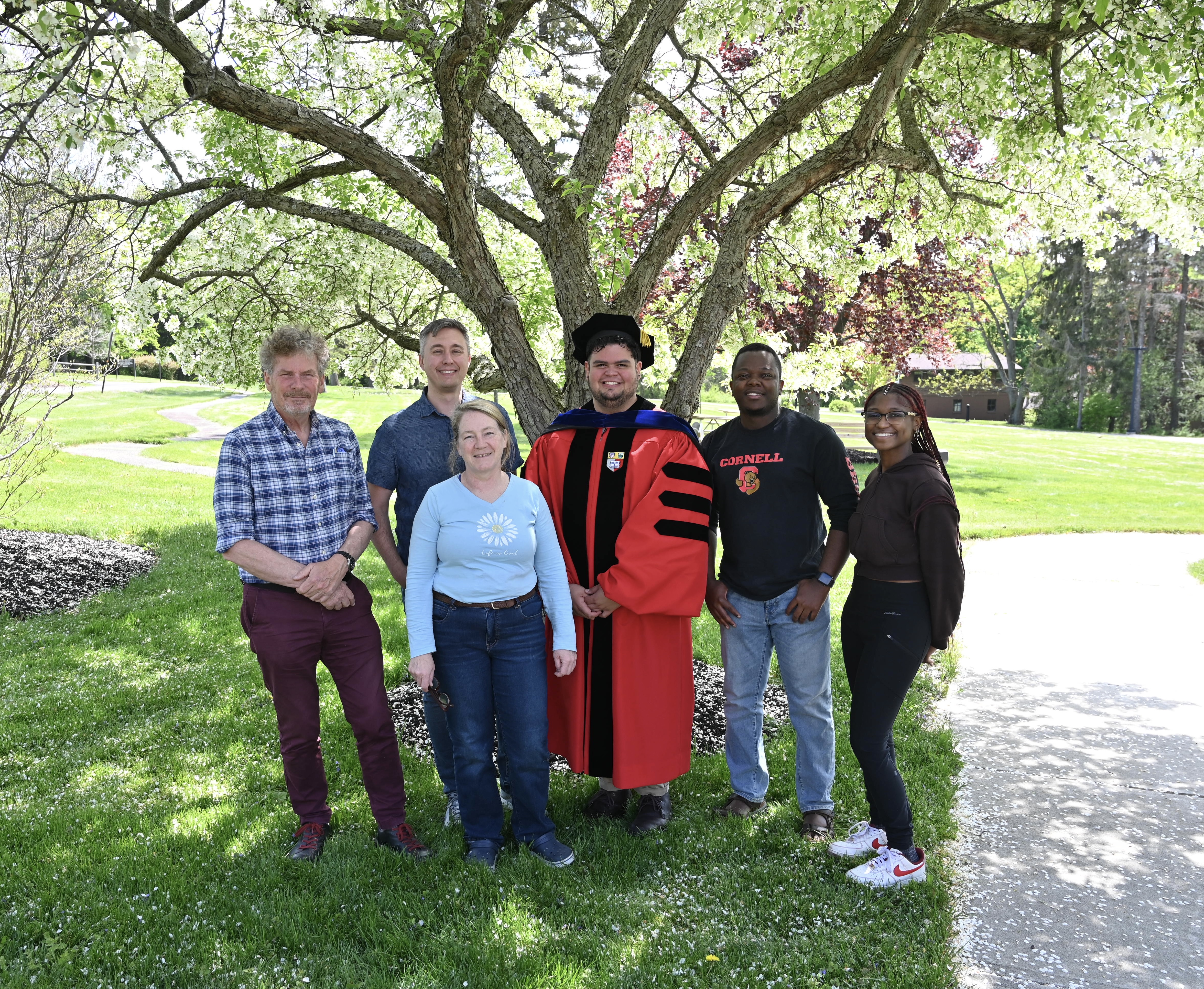Annual Report 2023
Pushing the Boundaries of Veterinary Science and Education

Director's Letter
Dear friends, supporters and members of the Baker Institute for Animal Health,
I am delighted to present the annual report for the Baker Institute, showcasing the remarkable achievements and progress made over the past year. As we reflect on our journey, it is my pleasure to share the exciting developments that have positioned the Baker Institute as a true hub of innovation in animal health.
In my second year serving as the Interim Director, I am proud to lead an institution that has been at the forefront of groundbreaking research since its establishment in 1950. The Baker Institute remains committed to its mission of being the hub of innovation, dedicating our efforts to improving the lives of both animals and humans.
I am delighted to announce the addition of Dr. Mandi de Mestre to our esteemed faculty. Dr. de Mestre brings a wealth of knowledge and expertise to the Institute, contributing significantly to our ongoing research initiatives.
I am also proud to announce that Dr. Colin Parrish, a distinguished member of our faculty since 1988, has been elected to the National Academy of Sciences. This prestigious recognition is a testament to Dr. Parrish's outstanding contributions to the field of veterinary science. This prestigious honor reflects the caliber of talent within our institution and reinforces our standing as a leader in scientific research.
In addition, we are thrilled to share that Dr. Laura Goodman has been honored with the 2023 Zoetis Award for Veterinary Research Excellence. This recognition highlights Dr. Goodman's dedication to pushing the boundaries of veterinary research and underscores the impact of our faculty's work on the broader scientific community.
The Baker Institute not only strives for scientific excellence but also places a strong emphasis on training the next generation of scientists. Our commitment to research training ensures that the legacy of innovation continues well into the future, with each generation building upon the discoveries of those who came before. This approach continues with one of our recent graduates, Robert Lopez-Astacio, as he serves as an example of Baker’s emphasis on scientific learning.
As we celebrate these achievements, we are mindful of the challenges and opportunities that lie ahead. The Baker Institute remains committed to fostering innovation, collaboration, and excellence in every facet of our work. Our commitment to pushing the boundaries of veterinary science and education is unwavering, and we look forward to continued growth in the coming years.
I want to express my sincere gratitude to our supporters, partners, and the entire Baker Institute community for your dedication. Together, we are making a long-lasting impact on the health and well-being of animals around the world.
Thank you for your continued support.
Sincerely,

Gerlinde Van de Walle, D.V.M, Ph.D.
Interim Director
Alfred H. Caspary Professor
Baker Institute for Animal Health
National Academy of Sciences - Colin Parrish

In a testament to his outstanding contributions to the field of virology, Colin Parrish, Ph.D. '84, the John M. Olin Professor of Virology at the Baker Institute for Animal Health, was elected as one of the four distinguished 2023 Cornell representatives to the National Academy of Sciences (NAS).
Parrish's work revolves around viruses that have transferred to alternative animal hosts, with a particular emphasis on dogs, giving rise to new epidemic diseases. His research is designed to explain the nuanced mechanisms by which these viruses navigate and propagate within novel host populations, thereby impacting animals such as dogs, cats, raccoons and foxes. His laboratory examines the intricacies of canine parvovirus and influenza viruses, contributing to a deeper understanding of the evolution of new host ranges for naturally emerging viruses.

A faculty member at Cornell since 1988, Parrish's commitment to advancing scientific knowledge extends beyond the laboratory. His leadership is exemplified by his role as the Director of the Baker Institute from 2010 to
2016 and his election to a three-year term as the President of the American Society for Virology in 2021.
Parrish's research, spanning molecular virology, structural biology, cell biology, epidemiological analysis, studies of viral pathogenesis and evolutionary analysis, has garnered international acclaim. Awarded a Fulbright scholarship in 2016, he spent the 2016-17 academic year as a visiting professor at the University of Glasgow, Scotland. Moreover, his dedication to excellence in research was underscored by the Association of American Veterinary Medical Colleges, which bestowed upon him the Excellence in Research Award in 2018.
This significant recognition underscores Parrish's distinguished and sustained achievements in original research. The four Cornell honorees stand alongside a select group of 120 members and 23 international members, all elected by the NAS for their exceptional contributions to diverse scientific disciplines.
This year brings the current active membership of the NAS to 2,565, with an additional 526 international members. Seventy-four Cornellians have earned entry to the academy since its inaugural elections in 1863.
Introducing Dr. Mandi de Mestre

The Baker Institute for Animal Health welcomed a prominent addition to its faculty in early 2023. Mandi de Mestre, BVSc (Hons) Ph.D. MRCVS PGCAP FHEA, is a seasoned professional whose clinical and basic research focuses on the immunobiology of the maternal-fetal interface with a particular interest in pregnancy-related conditions in the mare. Her academic home is the Department of Biomedical Sciences at the Cornell University College of Veterinary Medicine. She will serve in a leadership capacity to assist with the development of equine programs in the college.
de Mestre's path to Cornell began in her native Australia, where she studied veterinary medicine with a particular focus on equine health. Her interest in research blossomed during a summer spent at Cornell University as part of the Leadership Program for Veterinary Students. Subsequent experiences at North Carolina State University and a Ph.D. program in molecular and cellular biology and immunology at the Australian National University shaped her curiosity for the genetic and molecular basis of disease processes.
After completing her Ph.D., de Mestre pursued a postdoctoral position in the laboratory of Dr. Doug Antczak at the Baker Institute for Animal Health, where she delved into genetics, pregnancy immunobiology and offspring health. She then accepted a faculty position at the Royal Veterinary College, University of London, where she served on the faculty for 15 years.
Her expertise lies in understanding the normal processes supporting healthy pregnancies and identifying pathologies that compromise pregnancy, primarily in mares. de Mestre emphasizes the importance of evidence-based clinical decisions in reproductive medicine, with a broader goal of informing health strategies in humans and other veterinary species.
“Over the two breeding seasons I worked with Dr. Jane Axon at Scone Equine Hospital, I was exposed and contributed to the management of a huge caseload of foals, with up to 100 new neonate cases admitted monthly at peak times,” said de Mestre in reference to what encouraged her interest in the field. “At the time, we were focused on treating disease processes of neonatal life, but essentially those diseases resulted from pathologies that originated much earlier in embryonic and fetal life. That started my fascination with the link between fetal and neonatal health and pathologies that lead to a pregnancy failing.”

Proud moments in her academic career include teaching, mentoring and guiding students through their first discoveries and academic successes. de Mestre's clinical achievements involve the establishment of a biobank of tissues from clinical cases of pregnancy loss, leading to groundbreaking insights into aneuploidy as a common cause of early pregnancy loss in mares.
“My long-term goal is for our studies of equine pregnancy to lead to evidence-based decision making in reproductive practice through the development of novel diagnostic tests and treatments for pathologies that compromise pregnancy and fetal health,” said de Mestre. “Due to similarities in aspects of the biology of pregnancy in the mare and women, ultimately I hope our studies of horse pregnancy provide a natural disease model that also informs our understanding of the underlying mechanisms of miscarriage in women.”
As de Mestre embarks on this new chapter at Cornell, her work promises to advance the understanding of reproductive health, impacting not only veterinary medicine but also contributing to broader scientific knowledge with potential implications for human health.
“My research is at the interface of basic science and clinical research, and CVM provides a great combination of innovative research that extends from molecular mechanisms to applied clinical practice. There is a real sense of collaboration when you meet people and there are excellent facilities available for our work. The established links to Weill Cornell Medicine also mean our work could have an impact beyond animals.”
Zoetis Award for Veterinary Research Excellence - Dr. Laura Goodman

Laura Goodman, Ph.D. ’07, was honored in November with the 2023 Zoetis Award for Veterinary Research Excellence. The award is given annually to an early-stage faculty member who has demonstrated outstanding achievement in academic research of relevance to veterinary medicine.
Goodman received the award in recognition of her impactful research on pathogen genomics, including studies of antimicrobial resistance emergence in companion animals, molecular epidemiology in wildlife and tick-borne disease in production animals.
“Because I'm focused on the microbial world, I am really interested in how pathogens move between species,” Goodman said. “I’m particularly interested in how they affect the health of animals, both from an animal health perspective and also from a human health perspective.”

She presented her research, “Combatting Antimicrobial Resistance: How It Affects Pets and the Families Who Care for Them," to a full CVM lecture hall at a special seminar on Halloween. Goodman was also presented with an award plaque and was honored with a post-seminar reception.
“There's tremendous opportunity to identify new pathogens and improve diagnostics for conditions in animals where we need an earlier warning when something is happening, so that we would be able to have some kind of intervention sooner if we have better testing,” said Goodman. “That really was the big motivation for some of the research that was featured.”
The Cornell University College of Veterinary Medicine has highlighted and celebrated exceptional early-stage faculty members with the award for 38 years, dating back to its inaugural recipients, Drs. Karel Schat and Doug Antczak in 1986. Goodman, who was nominated by Drs. Gerlinde Van de Walle and Alex Travis, marks the 39th honoree in the award’s history.
Goodman worked as a postdoctoral associate at the Baker Institute for Animal Health from 2007 – 10, and currently serves as an assistant professor at Baker. She joins a list of current and former Baker faculty members to earn the Zoetis Award for Veterinary Research Excellence, including Drs. Travis, Van de Walle, Antczak, John Parker, Colin Parrish and Judith Appleton.
Robert Lopez-Astacio's Journey To Baker

In the vibrant city of Ponce, Puerto Rico, Robert Lopez-Astacio's journey into the world of scientific discovery began. Little did he know that his path would lead him to the Baker Institute for Animal Health, where his passion for research and a strong sense of community would shape the next six years of his life.
His connection with Baker started during his undergraduate years at the University of Puerto Rico in Ponce, where he first encountered Dr. Colin Parrish during a conference related to emerging viruses. Following rotations in the labs of Drs. Luis Schang and Parrish in the 2017-18 academic year, Lopez-Astacio joined the Parrish Lab for good the following summer.
Under the mentorship of Parrish, Lopez-Astacio dug into the intricate world of virology. His research centered around the canine parvovirus, using it as a tool to unravel the molecular mechanisms driving virus evolution. Armed with innovative techniques like next-generation sequencing and cryo-EM, Robert explored the complex interaction of the viruses with the host and how the viral genome can accommodate favorable mutations to overcome natural barriers while sustaining replication and transmission.
"My research helped to understand how the host immune system can force viruses to mutate, to describe how those mutations emerged and in what specific genes, and ultimately to show how those mutations can alter phenotypes such as virus-receptor interactions, antibody evasion, host range and the overall virus spread worldwide."

His work extended beyond the laboratory, encompassing collaborations with fellow researchers and resulting in the publication of seven papers, two of which he led as the primary author. The Baker community, with its steady support and camaraderie, played a crucial role in Robert's scientific journey.
"The people that I came across during my years at the institute made my time there a very enjoyable, unique and special experience," he expressed. "I not only created strong collaborations with other students and faculty within the institute, but also became friends with most of my peers."
Following Lopez-Astacio’s graduation in May of 2023, he left Baker armed not only with a wealth of scientific knowledge but also with a profound appreciation for the human side of research.
“I am currently working in the industry as a scientist focused on Liquid-Chromatography tandem to Mass Spectrometry techniques to help uncover drugs that could be potentially used as therapeutics for improving human health,” said Lopez-Astacio. "My plan is to continue growing as a scientist, to continue advocating for minorities and first-generation college students, to continue making a path for Latinos in science."
With enthusiasm, Dr. Robert Lopez-Astacio looks to the future, carrying the lessons learned and the connections forged during his transformative years at Baker.
"It is so fascinating to know that I still have a ton to learn, that I still have space to grow and that all the tools I acquired throughout my years at the Baker Institute and in the Parrish Lab are still valuable to continue advancing my personal and professional career. Thank you to Colin, thank you to Baker and thank you to Cornell!”
SUNY Chancellor’s Award - Dr. Gerlinde Van de Walle

Nineteen faculty and professional staff members from Cornell University’s four state contract colleges were acknowledged for their outstanding contributions with selections for the 2022-23 State University of New York (SUNY) Chancellor’s Awards for Excellence.
Among the honorees was Gerlinde Van de Walle, D.V.M., Ph.D., the Alfred H. Caspary Professor and current interim director of the Baker Institute for Animal Health.

Van de Walle's research focuses on studying the pathogenesis of equine viral diseases, studying the potential of bioactive factors secreted by stem cells to regenerate injured tissues and fight infections, and comparative studies to identify molecular mechanisms underlying low mammary cancer incidence. She assumed the role of interim director at the Baker Institute in 2022 and currently serves as the co-director of the Cornell Leadership Program for Veterinary Students.
The SUNY Chancellor Awards for Excellence aim to highlight individuals demonstrating intellectual vibrancy, advancing knowledge boundaries, providing quality instruction and serving the public good. Van de Walle's nomination for the award was submitted by Deborah Fowell, DPhil, Chair of the Department of Microbiology and Immunology at CVM.
"I am delighted that Dr. Van de Walle’s contributions to excellence in research have been recognized with this award,” said Fowell. “Her research stands out for tackling tough research questions with imaginative and innovative approaches and a clear vision for translating the findings into new ways to treat disease. We are proud to have Dr. Van de Walle as a member of our academic community.”


